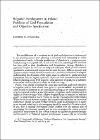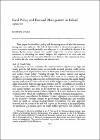Browsing Economic and Social Review Archive: Complete Collection 1969- by Date of Publication
Now showing items 21-40 of 920
-
Using absolute deviations to compute lines of best fit
(Economic & Social StudiesDUBLIN, 1970)There is some renewed interest among agricultural economists and others in the old technique of using minimized absolute deviations in computing lines of best fit. H. B. Jones and J. C. Thompson, in a recent article in ... -
Aspects of intercommunity population balance in Northern Ireland
(Economic & Social StudiesDUBLIN, 1970)The population of Northern Ireland is probably unique in that it is composed of two groups of people each of which can be characterized as a 'minority'. Conventional wisdom has it that at present there is a dominant ... -
Recent price trend in Ireland
(Economic & Social StudiesDUBLIN, 1970)In the first section we set out the major price trends since 1958 and indicate the principal cause of price inflation. In later sections we examine the effects of productivity, wage and profit rates, prices of imports and ... -
Inter-generational social mobility and individual differences among dubliners
(Economic & Social StudiesDUBLIN, 1970)The values of a culture are indicated by the personal qualities accompanying social success within it. Our object is to reveal some of the values of Dublin society by examining the relationship between certain personal ... -
Bailiwicks, locality, and religion - 3 elements in an irish dail constituency election
(Economic & Social StudiesDUBLIN, 1970)This article is essentially a case study of voting patterns in an Irish Dail Constituency. But in this analysis we also deal with a larger question: how a stable party system exists in a constituency characterized by ... -
Empirical study of age structure of irish population
(Economic & Social StudiesDUBLIN, 1970)The economic and social consequences of a population's age structure are far-reaching. The proportion of a country's population in the active age groups largely determines the relationship between productivity per worker ... -
Productivity, earnings and composition of labour - irish-manufacturing-industries, 1953-1966
(Economic & Social StudiesDUBLIN, 1970)In a paper read recently to the Statistical and Social Inquiry Society oflreland by one of the present authors,1 differences in the growth of labour productivity in Irish manufacturing industries over the period 1953 to ... -
Regional development in ireland - problems of goal formulation and objective specification
(Economic & Social StudiesDUBLIN, 1970)The establishment of a consistent set of goals and objectives is fundamental to the planning process since planning is concerned with attempting to realise predetermined results. Although specification of objectives is a ... -
Irish agriculture and associated industries 1964 - effects of various cereal policies
(Economic & Social StudiesDUBLIN, 1970)In the 1964 structure of Irish Agriculture and associated industries, as published in Paper Number 44 of the Economic and Social Research Institute, the exercises described below investigate the effects on the economy of ... -
Survey of some delinquent boys in an irish-industrial-school and reformatory
(Economic & Social StudiesDUBLIN, 1970)The research aimed at discovering specific social and psychological characteristics of institutionalized delinquent boys in the Irish Republic. Various researchers had considered separate aspects of juvenile delinquency ... -
Quantitative estimates of trade liberalisation - methods and results
(Economic & Social StudiesDUBLIN, 1970)The economic benefits of trade liberalisation are conventionally divided into two parts: static gains and dynamic gains. Static gains refer to the advantages of increased specialisation arising from easier access to ... -
Capital formation, technical change and labour productivity improvement - analysis of a cross-section of Irish manufacturing industries 1953-1967
(Economic & Social StudiesDUBLIN, 1971)The recent economic literature has given a good deal of attention to the analysis of production and technical change. During the second half of the 1950's, Solow published his path-breaking article on the causes of labour ... -
Social function of physical violence in an Irish urban area
(Economic & Social StudiesDUBLIN, 1971)This article is part of a study of the factors rendering people vulnerable to unemployment. While initially there was no intention of including violence within the scope of the survey, its prevalence necessitated that some ... -
Theoretical approach to investment-wage
(Economic & Social StudiesDUBLIN, 1971)Since the early fifties the investment-wage has been discussed in Germany as an instrument of incomes policies. After World War I I the shift in the distribution of income and the accumulation of wealth in favour of the ... -
Regional analysis - Northern Ireland experience
(Economic & Social StudiesDUBLIN, 1971)Since 1936 Northern Ireland, has had a higher unemployment rate than any other region of the United Kingdom. For the period 1927-1936, unemployment was proportionately higher in Wales and in 1932 it was higher in Scotland. ... -
Economic specification of neoclassical production function - case study
(Economic & Social StudiesDUBLIN, 1971)A production function may be defined as the mathematical expression of the technological information which relates the quantities of inputs to quantities of outputs. As such, the concept is perfectly general and a specific ... -
Regional problem in Ireland - some reflections upon development strategy
(Economic & Social StudiesDUBLIN, 1971)The current intense level of interest in regional development problems makes this an appropriate time to review certain aspects of Irish government strategy. The urgency of an appraisal is underlined by the fact that Irish ... -
Science, technology and development
(Economic & Social StudiesDUBLIN, 1971)The purpose of these two papers is to discuss hypotheses which may help to explain the limited growth of science and technology in the under-developed economies, and to explain also the restricted social function of science ... -
Note on national and county car ownership projections in ireland
(Economic & Social StudiesDUBLIN, 1971)In recent years Irish transportation problems have attracted considerable public interest and controversy. The principal reason for this has been the rapid rise in car ownership levels which expresses itself most clearly ... -
Fiscal policy and demand management in Ireland 1960-70
(Economic & Social StudiesDUBLIN, 1971)This paper discusses fiscal policy and the management of the Irish economy during the years 1960-70. The role of fiscal policy in demand management, as most economists would probably nowadays see it, is described in Section ...























